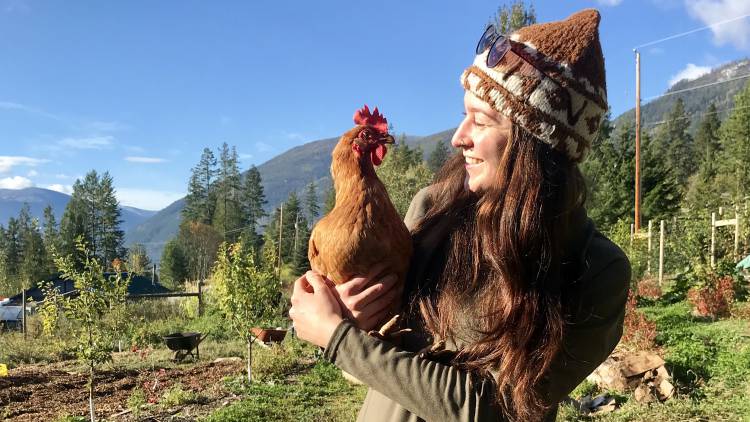With growing uncertainty around food security, more and more folk have realized we need to get a grip on our food systems. We need to understand much more than just the calorie content of our favourite snack, or how to cook that gourmet dish.
We need to begin looking at food in a different light.
The way we source and farm our food is a wildly unsustainable practice right now. Prevalent, first-world farming methods often deplete the soil of nutrients, do little to combat climate change, and force crops to grow based on economics, without consideration for the health of the land or soil.
But there are rebels in the food world, preaching and practicing a different way of growing.
Permaculture: the development of agricultural ecosystems intended to be sustainable and self-sufficient; a holistic, sustainable approach to gardening.
Permaculture is quickly gaining ground; no longer the preserve of hippie communes, the practice is moving mainstream as the need for a more sustainable approach to growing our food becomes apparent. And climate change presents our region and our farming practices with many challenges to overcome.
The Youth Climate Corps (YCC), an initiative launched by Wildsight with help from partners in the fall of 2020, dug deep into the research of food sustainability then got their hands dirty with some hands-on work in the field, applying their new-found permaculture knowledge.
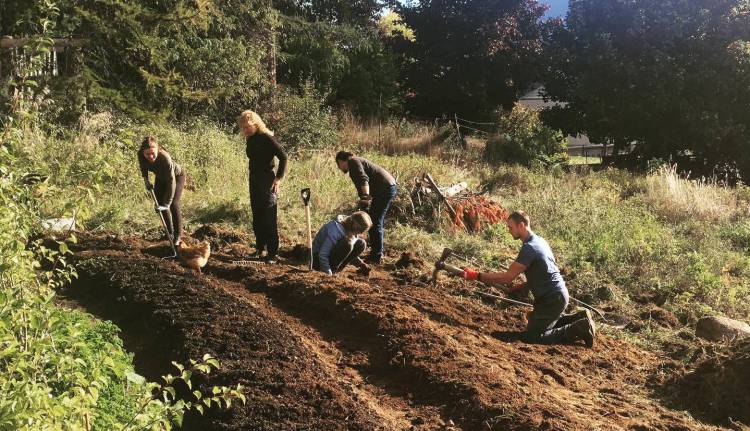
YCC crew members spent a week at the well-established Thimble Hill Nursery, a small-scale farm and plant nursery just outside Nelson BC, then a week at neighbouring Orion Organics Farm.
Kim Watt, owner of Thimble Hill Nursery, taught the crew the basics of permaculture, and how these farming practices are applied on her land. She highlighted the benefits of diversified farms that can sequester carbon and better handle uncertainty in a changing climate compared to more common approaches like single-crop, large-scale farms.
“Soil and land management have been massive emitters of greenhouse gasses,” explains Watt. “If we change our food systems, the way we manage soil and the way we grow our food, applying an ecological lens, we can actually use land as a carbon sink. We need to look at food and gardening from that climate change lens.”
With more than 18 years in the industry, Watt has seen the conversation positively shift to looking at farming as a climate solution. She was excited to share this knowledge with the YCC team, who proved enthusiastic and interested in solutions-based work.
“There’s more and more focus on prompting farming practices that are not just ‘less bad’, but actually good,” Watt says. “ It was great for me as a small farm, to get that influx of energy and enthusiasm of youth. And for them to get this hands-on experience: it really showed how able they are to apply the knowledge and give back to the community.”
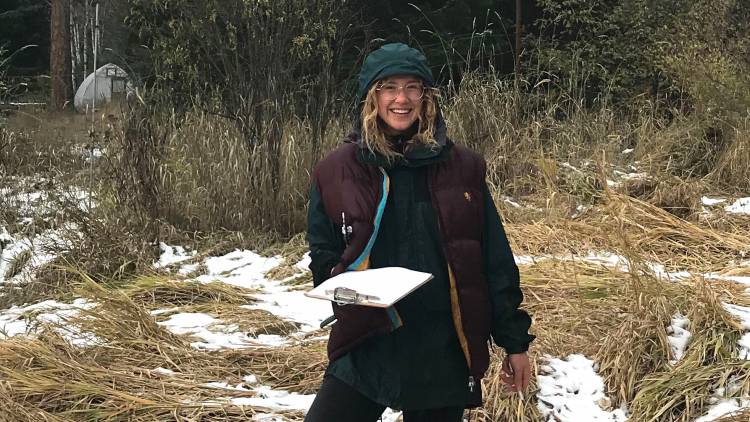
YCC team member Sophia Lewis found the week at Thimble Hill informative, and noted Watt was a great resource for understanding permaculture. Lewis grew up eating from a homegrown garden, with parents “really into permaculture.” She’s taken natural environment classes in university, learned about water pathways and sustainable food production, and was aware of problems facing the farming industry. Yet even with that layered background, Lewis found she left the two farms with a deeper level of understanding.
“I learnt how permaculture is applied in the real world. It opened my eyes to the smaller scale ways you can use permaculture on your own property, your own land,” says Lewis.
Wa-ya Aeon came in with more experience than many other YCC crew members. He was raised on a variety of organic farms, where terms like biodynamics and permaculture were as common as peanut butter and jam in most households. He was thoroughly impressed with the efforts at Thimble Hill to incorporate smart design across the farm.
“Every square inch has some sort of function; it was amazing to see permaculture systems applied so fully,” Aeon says. “It was designed with so much thought and care; I was inspired.”
Fresh off the week of their permaculture crash course, YCC members immersed themselves into a planning project at Orion Organics Farm, a farm farm that has bees, chickens, a small orchard and a large gardening plot.
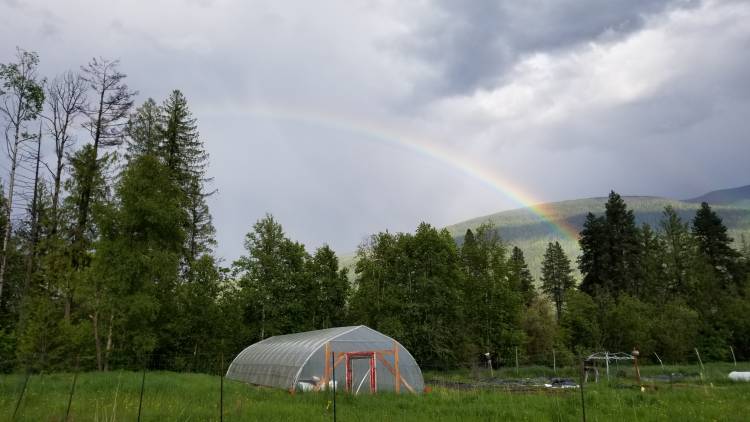
Farmers Dustin Cantwell and Catherine Anne have big plans for their 10 acre farm. They want to farm it sustainably, with a focus on the ongoing health of the land and the people who live and work in the area. A vision for the future includes developing a hospice cottage and an educational component for the land, teaching people how to grow food and care for animals.
“We recognize that we are obliged, out of respect for the Indigenous peoples of this area, to farm with a generational outlook and to reduce harmful practices,” says Cantwell.
With some greenhouses and outbuildings on site, they are looking to improve the site in the coming years. Their major issue has been water. What was once a dependable flowing stream has dried up, and water issues plague the property.
“When the farm was first started there were swampy areas, spring runoff made the soil moist for 4-6 weeks and garden activities were delayed due to the mud. These days the swampy areas are dry and the spring runoff lasts just a few weeks. Summers are getting hotter with less and less rain. Climate change is rapidly drying out the soil on the farm,” reports Cantwell.
While they have implemented some strategies to keep water on the land, the couple knew they needed to take a serious look at water storage. But finding the time to take an investigative approach was proving to be difficult. When COVID hit, their day-to-day operations were thrown up in the air.
“The respite from our established plans gave us the time needed to address the effects of weather change, and to add some much-needed infrastructure,” says Cantwell.
Then along came the YCC, and it seemed an answer to some of the problems could be found.
“We needed a map for the future. We wanted a design based on permaculture principles learned from local teachers. We needed a map of the property and ideas of how we could keep water for longer periods of time. This was no small feat,” Cantwell explains.
The couple let the YCC crew loose on the property and asked the team to be creative in their suggestions. In return, Orion would faithfully follow through with implementation where they were able.
“There was a bit of stress at the beginning due to the magnitude of this project,” admits crew member Aeon.
But, by week’s end, they had digitally mapped the property, and offered multiple concepts for sustainable farming.
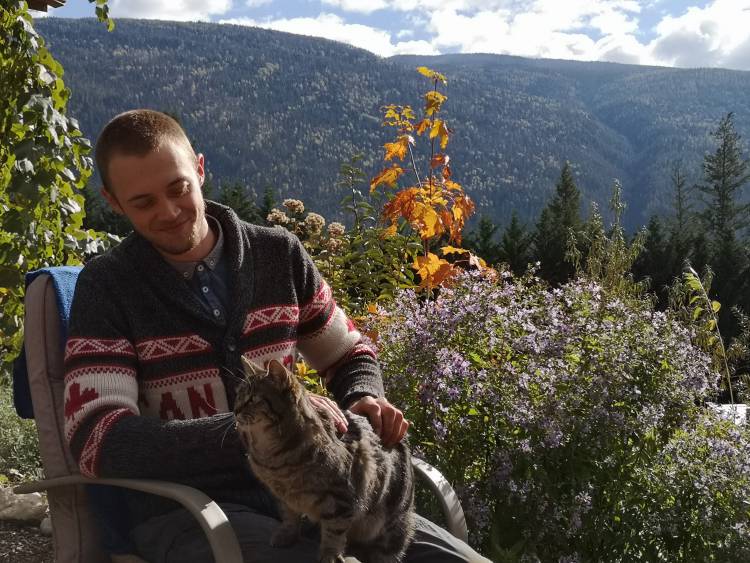
Aeon said while the week at Orion was intense, it was also enlightening, engaging, and impactful.
“As well as putting into practice our learned permaculture skills, I have a lot more confidence in myself,” reflects Aeon. “At Orion, we leaned into the creativity. I know I’m capable of so much more than I previously believed, and I learned about trust in teams. None of us could’ve done this alone.”
Cantwell and Anne were thoroughly impressed with the YCC’s results.
“The final product was an inspiring blend of permaculture, herbalism, sacred geometry, art, and design,” comments Cantwell. “Their presentation was creative and inspiring.”
We launched the YCC with the hopes of addressing some of the many impacts of the climate crisis, to provide meaningful employment to an under-employed age bracket and to empower young adults to affect real change. No small desires. The permaculture project proved this is not only an achievable wish list, but that there is great value in teaming up knowledgeable mentors with enthusiastic young adults and facilitating the group to enhance the world around them.
Program coordinator Graeme Lee Rowlands says the permaculture component of the inaugural Youth Climate Corps was an all-around success, with learning experiences for crew members combined and tangible, on-the-ground results for project partners.
“These projects, as well as our earlier work with the Kootenay Permaculture Institute, created fantastic learning experiences for our crew members while supporting key cogs of the local food system,” says Lee Rowlands. “They also tested a promising model for how the Youth Climate Corps can work effectively with private partners for the public good. We look forward to doing more in 2021.”
